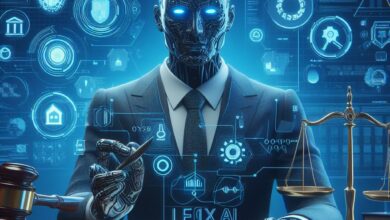Addressing Ethical Concerns: Universities Expand AI Education to Combat Deepfakes and Disinformation”

The White House has expressed concern over the rise of deepfakes and misinformation, calling for legislation to combat their spread and criminalize explicit deepfake content.
Universities are actively expanding AI education to meet industry demands and address ethical concerns, teaching students how to responsibly harness the potential of artificial intelligence.
The goal of AI education is to cultivate a new generation of experts capable of innovating using AI technology while upholding ethical standards and safeguarding against misuse.
Deepfakes and Misinformation: Universities Take Decisive Steps
Universities are taking crucial steps to enhance AI education. With the proliferation of AI technology, institutions recognize the need to equip students with the necessary tools to harness its potential responsibly and ensure responsible use.
AI is no longer confined to the realm of science fiction; it has firmly established itself in the real world. Companies across various industries actively seek professionals who can develop and implement AI applications. From creating innovative products to defending against cyber threats, AI applications are diverse and multifaceted.
Brian Halbach, founder of the cybersecurity company “Good Guy Hackers,” emphasizes the urgent need for AI experts. He sees them as a crucial element in the battle between good and evil, highlighting the importance of integrating AI specialists to protect intellectual property and maintain cybersecurity.
AI Education for Ethical Deployment
Educational institutions are expanding their offerings to address latent technology behind artificial intelligence and its ethical deployment. Mangit Rege, a data science professor at St. Thomas University, leads this effort. He underscores the necessity of educating students about technology’s capabilities and the potential for misuse. Rege’s creation of fake videos using AI technology serves as a stark reminder that appearances can be deceiving, emphasizing the importance of critical thinking in the digital age.
The ethical implications of artificial intelligence extend beyond academia. Even the White House has expressed concerns about the spread of fake and misleading information on social media platforms. White House Press Secretary, Karen Jean Pierre, urged these platforms to play a more proactive role in enforcing rules to prevent the dissemination of false and divisive content. The administration believes that legislation is needed to criminalize the creation and sharing of explicit deepfake images. In this context, the state of Minnesota has already enacted a deepfake law, making the sharing of explicit deepfake images without consent or using deepfakes to interfere in elections a criminal offense.
The Need for Ethical Regulation
The expansion of AI education revolves around producing AI specialists and instilling ethical values in those who will shape its future. Mangit Rege, echoing the sentiments of many in the field, believes that regulation is necessary to control how AI technology is used and prevent it from falling into the wrong hands. With technological advancements continuing, the dual nature of artificial intelligence, with both beneficial and harmful applications, becomes increasingly evident. Educators like Rege hope to convey a deep understanding of these ethical complexities to students.
In a world increasingly dominated by artificial intelligence, there is a growing need for individuals who can navigate its complexities while maintaining ethical standards. The hope is that AI education, with a focus on responsible and ethical use, will make a difference. Brian Halbach, the cybersecurity expert, remains optimistic about the emergence of a new generation of AI researchers capable of combating unethical AI practices. This optimism stems from the belief that informed and ethically conscious AI professionals can act as a bulwark against the misuse of this powerful technology.
Important Notice: Disclaimer Regarding Financial Advice
The information presented in this article is intended solely for informational purposes and should not be considered as financial advice. Coinshiba.online disclaims any responsibility for investment decisions made by individuals relying on the information provided herein. It is highly recommended to consult with a qualified professional or financial advisor before making any investment decisions. Your financial well-being is crucial, and seeking expert guidance ensures that your investment choices align with your individual financial goals and risk tolerance.





One Comment